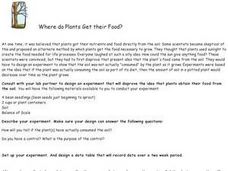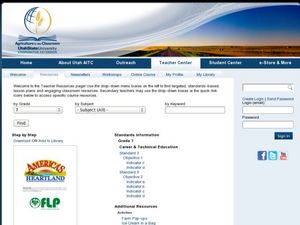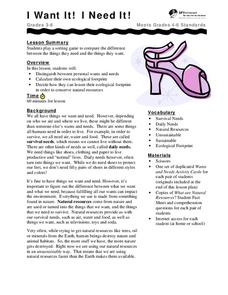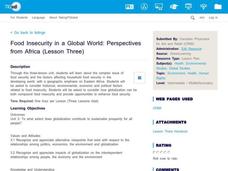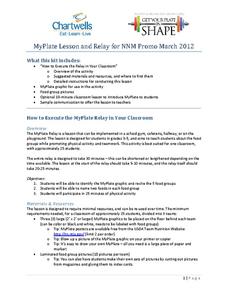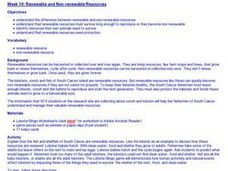Curated OER
Where Do Plants Get Their Food?
Plants need food to survive, just like any other living organism. Young biologists analyze an experiment performed in 1610 by Jan van Helmont to determine if plant nutrition is obtained through the soil. First, lab groups work together...
Curated OER
Food Pyramid Power: Looking Back and Moving Forward
Students show their knowledge of properties of objects as it pertains to sorting and creating patterns. In this food pyramid power instructional activity, students show their ability to use whole numbers in different representations by...
Curated OER
Where Does It Come From?
Do you or your learners know where apples or potato chips come from? If not, you will after this instructional activity. To explore careers in agriculture, learners first examine the importance of agriculture to our nation. They view...
Curated OER
America's Heartland: Step-By-Step Lesson Guide
An excellent resource gets kids looking at agricultural production to better understand the careers needed in distributing foods from the farm to the consumer. Book, poster, web, and video links are included for teacher use. There is...
Curated OER
Summer Science Recipes: Experiments on the Grill and in the Kitchen
Generate ideas about the most scientifically sound ways to prepare foods safely and efficiently during the summer season. Learners will use the GED Connection Science Workbook, so they can practice the skills needed to prepare for the...
City and County of San Francisco
I Want It! I Need It!
Discuss wants and needs with your elementary ecologists and get them to consider what would happen to our natural resources if we all got everything that we want. Learners play a card sorting game and take an ecological footprint quiz on...
Curated OER
What is an Ecological Footprint?
Introduce youngsters to the term ecological footprint. Learners identify ways in which humans affect the environment. They look at the problems associated with the use of natural resources, and focus on ways to preserve natural...
Curated OER
Food Insecurity in a Global World: Perspectives from Africa
Learners investigate food shortages. In this global issues instructional activity, students examine how food scarcity issues have impacted the people of Easter Africa. Learners use the information they gather to determine methods of...
Curated OER
Food Insecurity in a Global World: Perspectives from Africa (Lesson One)
High schoolers investigate food scarcity. In this global issues lesson, students examine food scarcity issues that have impacted the people of Eastern Africa. High schoolers use the information they gather to determine methods of...
Curated OER
Food Insecurity in a Global World: Perspectives from Africa
Students investigate food shortages. In this global issues lesson plan, students examine how food scarcity issues have impacted the people of Eastern Africa. Students use the information they gather to consider how historical, political,...
Curated OER
Food Chain Game
Students explore animal characteristics by participating in a role-play activity. In this food chain lesson, students discuss the order of life and how animals must eat other animals to survive. Students conduct a food chain game in...
Curated OER
Fresh Foods from Farm to Table
Are you a good egg? Learners begin a farm-to-table lesson by acting out verbs in groups to demonstrate the egg production process, and then research the steps using online resources. Several excellent videos are linked through the...
Cartwells
MyPlate Lesson and Relay
Youngsters are up and moving in an exciting relay race designed to help them better understand where common foods fall on the MyPlate nutritional guidelines. Working in teams, they identify images of foods and name what food groups they...
California Academy of Science
Exploring the Impacts of Feeding the World
Approximately 50 percent of people in the world who are chronically hungry work in agriculture. While it seems counter-intuitive, the farther you live from a farm, the more food options are available. Scholars explore concepts related to...
August House
Go to Sleep, Gecko
Use this multidisciplinary lesson to delve into these subjects: English language arts, math, science, drama, and character education. After reading, discussing, and making interpretations about Go To Sleep, Gecko!: A Balinese Folktale by...
Scholastic
Minibeasts
Lead young scientists to discover insects outdoors. After investigating, students will record observations, learn about these fascinating creatures, craft, and role play.
Howard Hughes Medical Institute
Building Ecological Pyramids
Looking for a fresh take on traditional food/energy pyramids? Conduct an innovative activity where pupils build their own! The lesson uses research data from Gorongosa National Park in Mozambique for a real-life safari touch. Scholars...
Wild BC
Bearly Any Ice
After reviewing food chains, your class members participate in an arctic predator-prey game that exemplifies the impact of climate change of food availability. If you are in a hurry, skip this lesson, but if you have the time to...
Towson University
The Crucial Concentration
Which sports drink provides the best pick-me-up after the big game or grueling workout? It may not be the one you'd think! Food science is the focus in a surprising lab activity. Pupils use colorimetry to determine the amount of protein,...
Florida Department of Health
Nutrition: Developing Healthy Habits Unit
The focus of the fourth unit in the Youth Risk Behavior Survey Curriculum is on healthy eating and exercise. Class members examine healthy habits data from the YRBD Youth Online Tool, learn about the importance of a healthy diet and...
Curated OER
Introduction to the Food Pyramid
Students review information on the food pyramid, either in printed works or on the Internet, to research healthy eating habits.
Curated OER
Prairie Food Chains & Webs
Students complete a food chain. In this ecosystem lesson, students learn about producers, consumers and decomposers. Students identify herbivores, carnivores and omnivores and complete two worksheets.
Curated OER
My Favorite Breakfast Foods
First graders consider the importance eating breakfast. For this breakfast foods lesson, 1st graders plan meals, examine a variety of breakfast options, and discuss the food groups. Students taste a variety of foods. Extension activities...
Curated OER
Renewable and Non-renewable Resources
Students play Lobster Bingo on a provided worksheet. This game demonstrates how human activities and natral events affect lobsters by impacting their food, clean water, and shelter of the reef.


